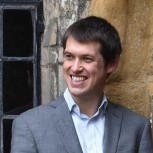
Professor of Soft-Matter Engineering
Academic Division: Mechanics, Materials and Design
Telephone: +44 1223 7 60502
Email: jsb56@cam.ac.uk
Research interests
Currently recruiting PhD students, in theory, computation or experiment. Strong UK students have a very good chance of securing an EPSRC studentship, and international students can apply for University scholarships. Email Dr John Biggins for more details.
Soft Mechanics
Soft solids are found throughout biology and engineering - we eat them, sleep on them and are made out of them. Familiar examples include rubber, jelly, sponge, muscle and skin. I am interested in the mechanics of these materials: how do they deform, contort and fail? The hallmark of such soft solids is that they can deform substantially, and in response to slight and diverse stimuli. Their solid mechanics is correspondingly rich and dramatic, with many examples of spectacular shape changing phenomena for us to understand, and ultimately use in shape-shifting devices.
Currently, my research in soft solids is mostly focused on two themes. Firstly, I work on liquid crystal elastomers, which are a new type of engineering material that can contract on demand - i.e. an artificial muscle. Engineers have not previously had access to such shape changing materials, and they open new vistas for soft shape-shifting machines. Secondly, I work on elastic instabilities such as wrinkling and buckling. Such instabilities are much richer in soft materials than stiff materials, as the materials can survive them, so the instabilities can be used to switch shape and impart function. For example, I have elaborated a hypothesis that the human brain folds into gyri and sulci via a mechanical wrinkling instability. More details of my research themes, and several dramatic videos, can be found at https://www.soft.eng.cam.ac.uk/research.html
My research is all rooted in theory, particularly continuum mechanics, geometry and condensed matter physics. However, I also find that good theory must be done in close dialogue with experiment. Accordingly, I collaborate widely with leading experimentalists, and my group is now building our own experimental capacity.
Teaching activity
Lecturer of IB Lagrangian Mechanics (2P1)
Lecturer of IIB Variational Methods (4M12)
Biography
John Biggins read natural sciences at Cambridge University. He specialized in experimental and theoretical physics, and was the top ranked student in his cohort. He then did a PhD in the theory of condensed matter group under the supervision of Prof Mark Warner FRS, working on the exotic elasticity of a new phase of soft matter known as a liquid crystal elastomer (LCE). During his PhD he made an extended visit to Caltech to work with Prof Kaushik Bhattacharya on analogies between LCEs and shape memory alloys.
After his PhD, John won an 1851 Royal Commission Fellowship and traveled to Harvard to work with Prof L. Mahadevan on instabilities in soft solids and biological tissues, including creasing, fingering and brain folding. He then returned to Cambridge, first as Walter Scott Research Fellow at Trinity Hall and then as an early career lecturer in the tcm group at the Cavendish Laboratory. During this time, he explained the viral youtube phenomena of the chain fountain, and explored how surface tension can sculpt soft solids, leading to a solid analogue of the Plateau–Rayleigh instability. He also taught first year oscillations, and a third year course "theoretical physics 1."
In 2017, John was appointed to an Assistant Professorship of applied mechanics in Cambridge Engineering Department, where he teaches mechanics and variational methods. In 2019 he won a UKRI Future Leaders Fellowship on "Liquid Crystal Elastomers, from new materials via new mechanics to new machines." This grant added an exciting experimental component to the group, and underpins our current focus on using LCEs as artificial muscles in soft mechanical devices.
John is also a fellow of Corpus Christi College, where he is a pastoral tutor and a director of studies.
Department role and responsibilities
Leader of Div C RDC
